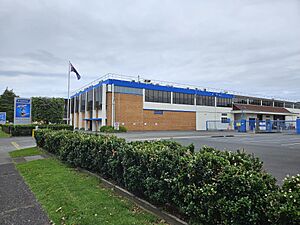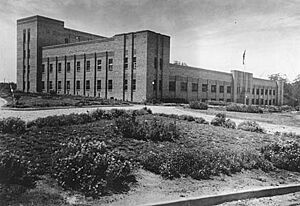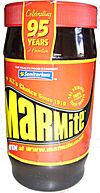Sanitarium Health and Wellbeing Company facts for kids
 |
|

|
|
| Private | |
| Industry | Food |
| Founded | 1898, in Melbourne, Victoria |
| Headquarters | Berkeley Vale, New South Wales, Australia Auckland, New Zealand |
|
Key people
|
|
| Products | Weet-Bix Up & Go Peanut butter So Good Marmite Alternative Dairy Company |
| Revenue | A$300 million |
|
Number of employees
|
1700 |
| Parent | South Pacific Division of Seventh-day Adventists |
The Sanitarium Health and Wellbeing Company is the name for two food companies: Australian Health and Nutrition Association Ltd and New Zealand Health Association Ltd. Both companies are fully owned by the Seventh-day Adventist Church.
Sanitarium started in Melbourne, Victoria, in 1898. Today, it has factories in Australia and New Zealand. They make many different breakfast cereals and vegetarian foods. All their products are made from plants or are vegetarian. Their most famous product is Weet-Bix, which is very popular in Australia and New Zealand.
Contents
How Sanitarium Started

In the 1890s, a man named William C. White was in Australia. He convinced Edward Halsey, a baker from the Battle Creek Sanitarium in America, to move to Australia. Edward Halsey was a Seventh-day Adventist.
Halsey arrived in Sydney, New South Wales, on November 8, 1897. He rented a small bakery in Melbourne. There, he started making granola, which was a mix of wheat, oats, maize, and rye. He also made Granose, which was an early version of Weet-Bix, but without sugar. Halsey and his team sold these foods by going door-to-door. They offered them as healthier choices compared to the fatty foods that were common back then.
The business later moved to a bigger place in Cooranbong, New South Wales. This new location was right next to a seminary, which later became Avondale University College.
In 1900, Halsey moved to New Zealand. He began making Granola there, which was New Zealand's first breakfast cereal. He also made Caramel Cereals, a coffee substitute, and wholemeal bread. He started this in a small wooden shed in Papanui, a suburb of Christchurch.
Today, Sanitarium New Zealand and Sanitarium Australia are separate companies. However, they still work closely together.
Sanitarium has factories in several places. These include Berkeley Vale in New South Wales, Carmel near Perth, Brisbane, and Auckland, New Zealand. Weet-Bix was first made in 1928 in Leichhardt, New South Wales. Sanitarium bought Weet-Bix in 1930. Another factory was built in Warburton, Victoria, in 1925 to make Granose. This factory was damaged by floods in 1934. A new one was built and started working by 1938. It made Granose and later Weet-Bix until 1997. This factory was special because it had its own power plant that also supplied electricity to the town of Warburton.
A factory in Palmerston North, New Zealand, closed in the late 1990s. The Hackney factory in Adelaide, South Australia, closed in October 2010. The Cooranbong factory closed in 2018.
In June 2017, Sanitarium had a disagreement with a shop owner in Christchurch, New Zealand. The shop owner tried to bring 300 boxes of Weetabix from Britain into New Zealand. New Zealand Customs held the boxes because Sanitarium said Weetabix was too similar to their own 'Weet-bix' and could confuse customers. Sanitarium faced some criticism in New Zealand because of this. After they could not agree, Sanitarium took the shop owner to court. The court case started in the High Court at Christchurch on July 30, 2018. Weetabix is also sold as "Whole Wheat Biscuits" in Australia.
Why Sanitarium Doesn't Pay Company Tax
Neither the Australian nor the New Zealand Sanitarium companies pay company tax on their profits. This is because they are owned by a religious organization. On their website, Sanitarium explains that they operate only for charitable purposes. They state that tax exemptions are available to all companies and people in New Zealand who work for charitable reasons. However, some competitors think this exemption is unfair.
In February 2019, businesses run by the Seventh-day Adventist Church reported more than $10 million in profit.
Sanitarium Products
Honey Puffs
Honey Puffs is a breakfast cereal made from wheat. It is coated with honey and sold in Australia and New Zealand.
Marmite
Marmite is a food spread made in New Zealand. It is created from yeast extract, which is a by-product of making beer.
So Good (Plant-Based Drinks)
So Good is a brand of drinks, foods, and desserts that do not contain dairy. They are also free of lactose, cholesterol, and gluten. So Good products are made by Sanitarium Health and Wellbeing Company in Australia and New Zealand. In Canada, Earth's Own Food Company used to make them. So Good is also sold in India by Life Health Foods.
In Australia, So Good makes soy milk, almond milk, and almond and coconut milk. They also produce flavored soy milk and frozen soy desserts.
In India, So Good makes almond milk and almond and coconut milk. They also offer flavored soy milk, flavored almond milk, special fortified soy milk, and different types of oat milk.
Up & Go
Up & Go is a brand of liquid breakfast products. Sanitarium Health and Wellbeing Company makes and sells them. This brand was the first to create the liquid breakfast category in supermarkets and convenience stores in Australia and New Zealand. Many other brands have joined this category since the late 1990s. This has made Up & Go work to keep its share of the market.
In June 2013, Choice magazine looked at 23 liquid breakfast products. They questioned some claims made by companies, including Up & Go, about fiber content. Sanitarium defended Up & Go. They said that their product met the rules for nutrient claims. They explained that a product needs at least 3 grams of fiber per serving to be called "high in fiber." Up & Go had 3.8 grams of fiber in each 250-ml serving.
Weet-Bix
Weet-Bix is a wheat breakfast cereal. It is made in Australia and New Zealand. It is also made in South Africa by Bokomo.
 | Delilah Pierce |
 | Gordon Parks |
 | Augusta Savage |
 | Charles Ethan Porter |


